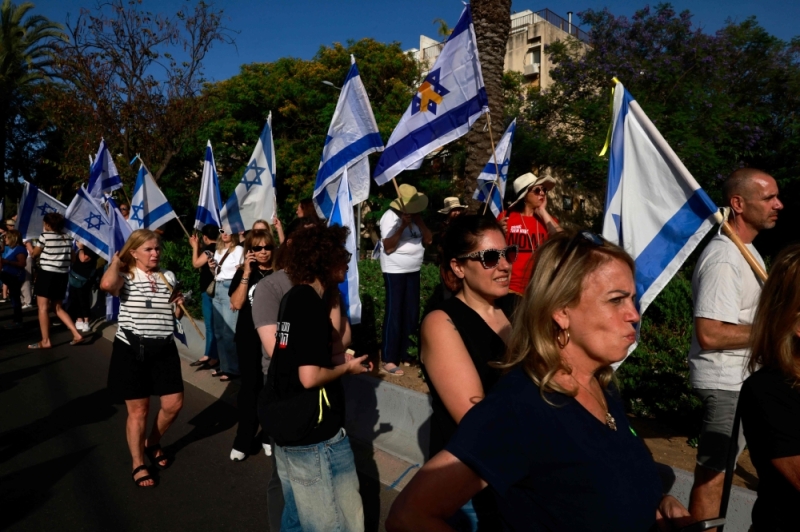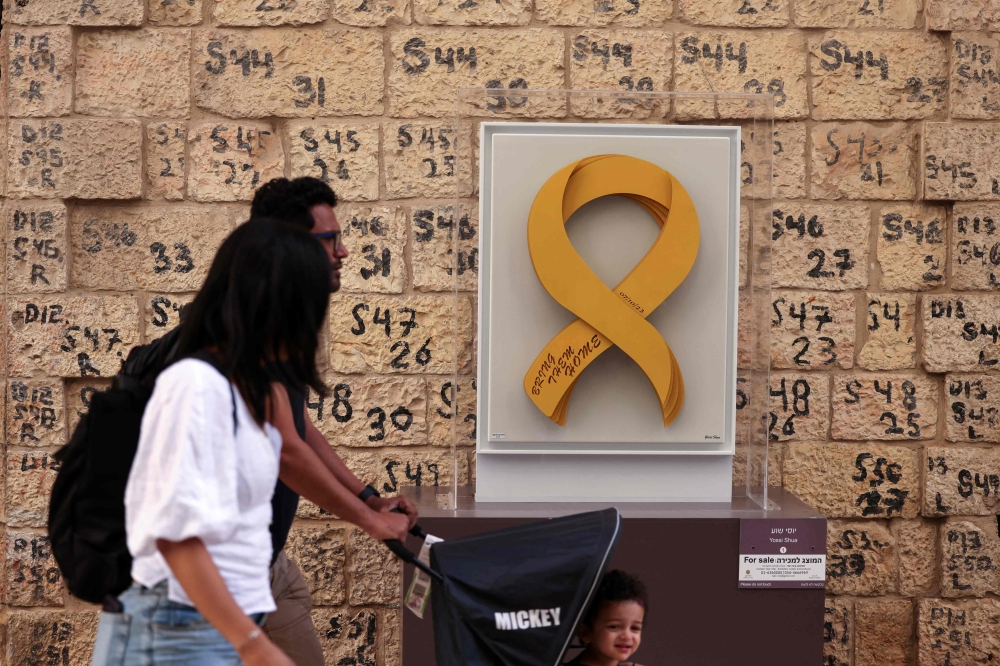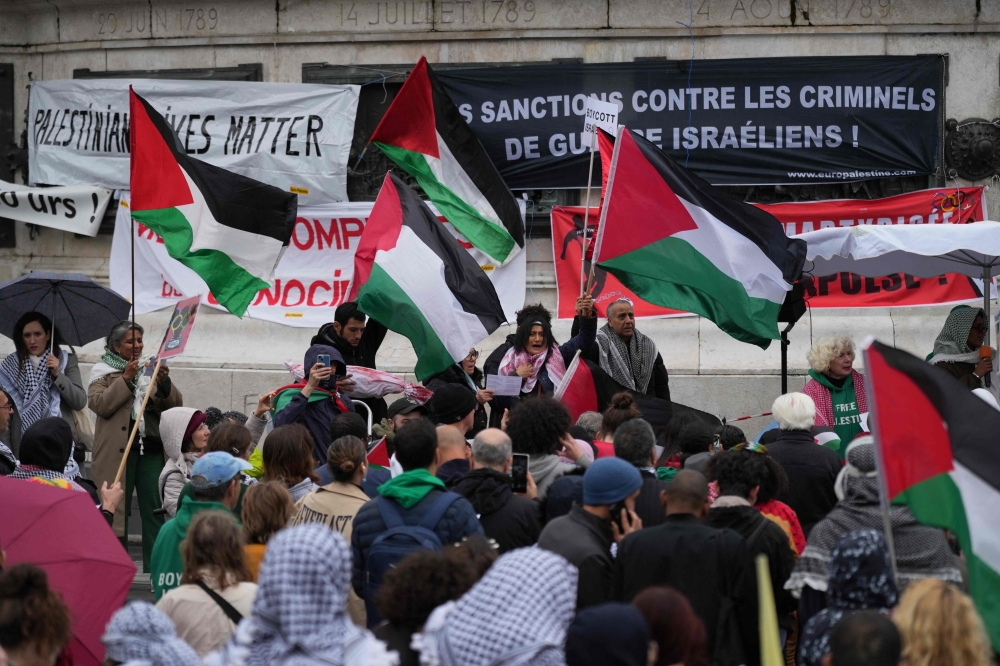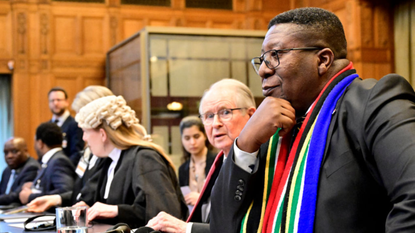World ‘against Israel’
NO, IT'S ISRAEL AGAINST THE WORLD

File photo of Israelis attending the funeral of Hanan Yablonka, one of the Israeli hostages held in the Gaza Strip since the October 7, 2023 attack by Palestinian Hamas militants, in Tel Aviv on May 26, 2024, as they also chant slogans demanding the release of the rest of the hostages. — AFP pic

File photo of Israelis attending the funeral of Hanan Yablonka, one of the Israeli hostages held in the Gaza Strip since the October 7, 2023 attack by Palestinian Hamas militants, in Tel Aviv on May 26, 2024, as they also chant slogans demanding the release of the rest of the hostages. — AFP pic
Saturday, 01 Jun 2024
JERUSALEM, June 1 — A series of diplomatic setbacks, strong condemnation of a recent Gaza strike, and intense protests on Western campuses have left Israelis feeling their country is unfairly isolated.
Israelis expected unwavering support from their allies and the international community after Hamas’s October 7 attack.
But as Israel’s retaliatory offensive against Hamas in Gaza deepened, it seems to have lost the sympathy it initially received after the unprecedented attack.
This loss of support intensified following last week’s Israeli strike on a camp for displaced Palestinians in Rafah, which killed at least 45 people, according to Gazan officials. The military has denied targeting the camp.
The strike drew condemnations from Istanbul to Beijing and from Washington to Paris.
On social media platform Instagram, more than 47 million posts with the hashtag “All eyes on Rafah” have been recorded since the strike.
But Israelis remain defiant despite the growing isolation.
“I don’t think Israel should care what the world has to say... I support our military 100 percent,” Netanel Aronson, a 24-year-old Israeli-American, told AFP.
“I pray for them every day that they should be safe and come home.”

File photo of members of a family walking past a logo designed to represent the Israeli hostages held in the Gaza Strip since the October 7, 2023 attack by Palestinian Hamas militants on Israel, on Alrov Mamilla Avenue in Jerusalem on May 26, 2024. — AFP pic
‘Tragedy for everyone’
At least 36,379 Palestinians, mostly civilians, have been killed in Gaza in Israeli bombardments and ground offensive since October 7, according to the health ministry in Hamas-run territory.
Israel’s retaliatory campaign came after the Hamas attack resulted in the deaths of 1,189 people in Israel, mostly civilians, according to an AFP tally based on official Israeli figures.
The militants also took 252 people as hostages, of which 121 are still held in Gaza, including 37 the military says are dead.
“It is a tragedy for everyone,” said Nathalie, who declined to give her last name, referring also to the fate of Palestinians in the Gaza Strip.
“Since everybody is connected, we can see what’s happening. We feel that we are hated,” the 50-year-old said.
“We have the feeling that we are accused of being colonialists and imperialists. But we see ourselves as refugees,” she added, echoing the feeling of many Jews who arrived during the creation of Israel in 1948.
The Palestinians call the creation of Israel as the Nakba — or “catastrophe” — when about 760,000 Palestinians fled or were forced from their homes by the war over Israel’s creation.
Last month, Israel faced a series of diplomatic setbacks.
While the International Court of Justice ordered Israel to stop its ongoing offensive in Rafah, the chief prosecutor of the International Criminal Court sought arrest warrants for Prime Minister Benjamin Netanyahu and Defence Minister Yoav Gallant, along with three senior Hamas leaders.
Ireland, Norway and Spain also recognised a Palestinian state in a coordinated decision on Tuesday, while Slovenia’s parliament is due to vote on such a proposal next week.

Protesters waves Palestinian flags during a demonstration to show support to Palestinians in central Paris on May 31, 2024. — AFP pic
World ‘against Israel’
Political analyst Dahlia Scheindlin said Israelis were aware the war was damaging their global standing.
“(Israelis) think the world is against Israel. They think that many institutions and countries are anti-Semitic, and that there is a double standard,” Scheindlin said.
She regretted the “devastating” impact of the war on Gazans, but said Israelis see the ongoing military campaign as an “existential struggle” for their people.
Scheindlin said Israelis have been demoralised over the setbacks at international tribunals after Israel was accused of committing some of the worst crimes in Gaza.
Such crimes “Israelis believed were only ever committed against them”, she added.
“So, it’s very hard for them to accept this. They fear the isolation.”
Israelis are also countering the social media campaign “All Eyes on Rafah,” with their own that says “If your eyes are on Rafah, then help us find the hostages”.
In a survey by US-based Pew Research Center before the May 26 strike on a camp of displaced people in Rafah, 40 percent of Israelis thought the country would “definitely” achieve its Gaza war goals.
Only four percent of the Jewish majority thought Israel’s military response in the Palestinian territory had gone “too far”.
But for Christians like Annie Dikbikian, the war has only increased “the hatred” on both sides.
“It’s affecting us... as Christians,” said the Jerusalem-based hairdresser, who hoped “peace, love, and respect” would return soon.
JERUSALEM, June 1 — A series of diplomatic setbacks, strong condemnation of a recent Gaza strike, and intense protests on Western campuses have left Israelis feeling their country is unfairly isolated.
Israelis expected unwavering support from their allies and the international community after Hamas’s October 7 attack.
But as Israel’s retaliatory offensive against Hamas in Gaza deepened, it seems to have lost the sympathy it initially received after the unprecedented attack.
This loss of support intensified following last week’s Israeli strike on a camp for displaced Palestinians in Rafah, which killed at least 45 people, according to Gazan officials. The military has denied targeting the camp.
The strike drew condemnations from Istanbul to Beijing and from Washington to Paris.
On social media platform Instagram, more than 47 million posts with the hashtag “All eyes on Rafah” have been recorded since the strike.
But Israelis remain defiant despite the growing isolation.
“I don’t think Israel should care what the world has to say... I support our military 100 percent,” Netanel Aronson, a 24-year-old Israeli-American, told AFP.
“I pray for them every day that they should be safe and come home.”

File photo of members of a family walking past a logo designed to represent the Israeli hostages held in the Gaza Strip since the October 7, 2023 attack by Palestinian Hamas militants on Israel, on Alrov Mamilla Avenue in Jerusalem on May 26, 2024. — AFP pic
‘Tragedy for everyone’
At least 36,379 Palestinians, mostly civilians, have been killed in Gaza in Israeli bombardments and ground offensive since October 7, according to the health ministry in Hamas-run territory.
Israel’s retaliatory campaign came after the Hamas attack resulted in the deaths of 1,189 people in Israel, mostly civilians, according to an AFP tally based on official Israeli figures.
The militants also took 252 people as hostages, of which 121 are still held in Gaza, including 37 the military says are dead.
“It is a tragedy for everyone,” said Nathalie, who declined to give her last name, referring also to the fate of Palestinians in the Gaza Strip.
“Since everybody is connected, we can see what’s happening. We feel that we are hated,” the 50-year-old said.
“We have the feeling that we are accused of being colonialists and imperialists. But we see ourselves as refugees,” she added, echoing the feeling of many Jews who arrived during the creation of Israel in 1948.
The Palestinians call the creation of Israel as the Nakba — or “catastrophe” — when about 760,000 Palestinians fled or were forced from their homes by the war over Israel’s creation.
Last month, Israel faced a series of diplomatic setbacks.
While the International Court of Justice ordered Israel to stop its ongoing offensive in Rafah, the chief prosecutor of the International Criminal Court sought arrest warrants for Prime Minister Benjamin Netanyahu and Defence Minister Yoav Gallant, along with three senior Hamas leaders.
Ireland, Norway and Spain also recognised a Palestinian state in a coordinated decision on Tuesday, while Slovenia’s parliament is due to vote on such a proposal next week.

Protesters waves Palestinian flags during a demonstration to show support to Palestinians in central Paris on May 31, 2024. — AFP pic
World ‘against Israel’
Political analyst Dahlia Scheindlin said Israelis were aware the war was damaging their global standing.
“(Israelis) think the world is against Israel. They think that many institutions and countries are anti-Semitic, and that there is a double standard,” Scheindlin said.
She regretted the “devastating” impact of the war on Gazans, but said Israelis see the ongoing military campaign as an “existential struggle” for their people.
Scheindlin said Israelis have been demoralised over the setbacks at international tribunals after Israel was accused of committing some of the worst crimes in Gaza.
Such crimes “Israelis believed were only ever committed against them”, she added.
“So, it’s very hard for them to accept this. They fear the isolation.”
Israelis are also countering the social media campaign “All Eyes on Rafah,” with their own that says “If your eyes are on Rafah, then help us find the hostages”.
In a survey by US-based Pew Research Center before the May 26 strike on a camp of displaced people in Rafah, 40 percent of Israelis thought the country would “definitely” achieve its Gaza war goals.
Only four percent of the Jewish majority thought Israel’s military response in the Palestinian territory had gone “too far”.
But for Christians like Annie Dikbikian, the war has only increased “the hatred” on both sides.
“It’s affecting us... as Christians,” said the Jerusalem-based hairdresser, who hoped “peace, love, and respect” would return soon.
— AFP
Israel's isolation: an overdue 'reckoning'?
Netanyahu faces moment of 'extreme crisis' following ICJ order to halt Rafah assault

Israel faces a 'diplomatic disaster' as it continues its Gaza offensive
(Image credit: Nick Gammon / AFP / Getty Images)
BY THE WEEK UK
PUBLISHED 5 DAYS AGO
The Gaza war is a "military quagmire and a human tragedy", said The Economist. It is also fast turning into a "diplomatic disaster for Israel", at a critical juncture in its history.
Last week, the International Criminal Court's prosecutor alleged that Prime Minister Benjamin Netanyahu and his defence minister had committed war crimes in Gaza: using starvation as a weapon of war and deliberately attacking civilians. (Hamas's leaders were also accused of war crimes.) The move is bitterly contentious, and the ICC judges won't decide for weeks whether there's enough evidence to issue warrants.
There is certainly an arguable case that Netanyahu's government has "breached the laws of war" in Gaza by not providing food and medicine to civilians "to the fullest extent of the means available", as the Geneva Conventions demand. Either way, the PM's "disastrous" strategy in Gaza has brought "ignominy" to Israel. His departure is long overdue.
Israel's 'fire alarm'
The ongoing humanitarian catastrophe in Gaza, and Netanyahu's determination to press on with the offensive in Rafah – the southern city where more than a million civilians have sought sanctuary – make it ever harder for Israel's allies to back it, said the FT.
Last week, the International Court of Justice (ICJ) ordered Israel to immediately halt its assault in Rafah. Israeli forces pushed on, and on Sunday, 45 people, including many women and children, were killed in an air strike on an encampment housing displaced people in a supposedly safe zone.
Meanwhile, Ireland, Norway and Spain have all recognised Palestinian statehood – a "symbolic blow against an Israeli leader who rails against any talk of a two-state solution".
An "international reckoning" has long been coming, given Netanyahu's record of refusing to offer a credible peace plan to the Palestinians, said Jo-Ann Mort in The Guardian. Now a moment of "extreme crisis" has arrived. This is "a fire alarm for Israel". Will it take heed?
A weakening position
"The world is pitted against Israel in a way we haven't seen before," said The Jerusalem Post.
Much of the international pressure comes from "smug, sanctimonious" critics embracing a "ludicrous and disgusting double standard": why did the ICJ ask for Israel's Rafah operations to be halted, but not for Hamas to free Israeli hostages? Yet we must accept that our leaders' poor decisions and inflammatory rhetoric have paved the way for this growing isolation.
The current pursuit of "total victory", without defining any political goals that can slow the "escalating cycle of bloodshed", has not made us stronger, said Tehila Wenger in Haaretz. It has made us weaker – and is losing us friends.
Netanyahu faces moment of 'extreme crisis' following ICJ order to halt Rafah assault

Israel faces a 'diplomatic disaster' as it continues its Gaza offensive
(Image credit: Nick Gammon / AFP / Getty Images)
BY THE WEEK UK
PUBLISHED 5 DAYS AGO
The Gaza war is a "military quagmire and a human tragedy", said The Economist. It is also fast turning into a "diplomatic disaster for Israel", at a critical juncture in its history.
Last week, the International Criminal Court's prosecutor alleged that Prime Minister Benjamin Netanyahu and his defence minister had committed war crimes in Gaza: using starvation as a weapon of war and deliberately attacking civilians. (Hamas's leaders were also accused of war crimes.) The move is bitterly contentious, and the ICC judges won't decide for weeks whether there's enough evidence to issue warrants.
There is certainly an arguable case that Netanyahu's government has "breached the laws of war" in Gaza by not providing food and medicine to civilians "to the fullest extent of the means available", as the Geneva Conventions demand. Either way, the PM's "disastrous" strategy in Gaza has brought "ignominy" to Israel. His departure is long overdue.
Israel's 'fire alarm'
The ongoing humanitarian catastrophe in Gaza, and Netanyahu's determination to press on with the offensive in Rafah – the southern city where more than a million civilians have sought sanctuary – make it ever harder for Israel's allies to back it, said the FT.
Last week, the International Court of Justice (ICJ) ordered Israel to immediately halt its assault in Rafah. Israeli forces pushed on, and on Sunday, 45 people, including many women and children, were killed in an air strike on an encampment housing displaced people in a supposedly safe zone.
Meanwhile, Ireland, Norway and Spain have all recognised Palestinian statehood – a "symbolic blow against an Israeli leader who rails against any talk of a two-state solution".
An "international reckoning" has long been coming, given Netanyahu's record of refusing to offer a credible peace plan to the Palestinians, said Jo-Ann Mort in The Guardian. Now a moment of "extreme crisis" has arrived. This is "a fire alarm for Israel". Will it take heed?
A weakening position
"The world is pitted against Israel in a way we haven't seen before," said The Jerusalem Post.
Much of the international pressure comes from "smug, sanctimonious" critics embracing a "ludicrous and disgusting double standard": why did the ICJ ask for Israel's Rafah operations to be halted, but not for Hamas to free Israeli hostages? Yet we must accept that our leaders' poor decisions and inflammatory rhetoric have paved the way for this growing isolation.
The current pursuit of "total victory", without defining any political goals that can slow the "escalating cycle of bloodshed", has not made us stronger, said Tehila Wenger in Haaretz. It has made us weaker – and is losing us friends.
No comments:
Post a Comment